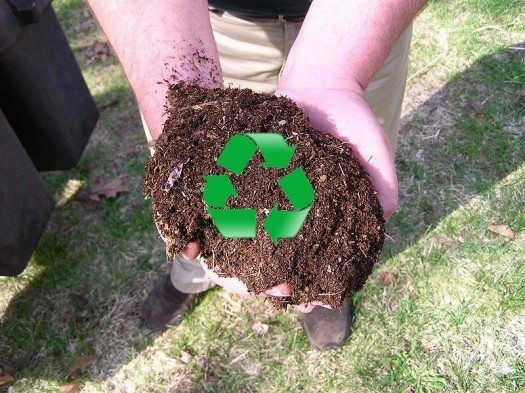Environment
How Leftovers Will Let Us Breathe Easier and Create Jobs

Many of us try to be diligent about putting our empty bottles and cans in the blue recycling bin, but what do we do with our apple peels and coffee grounds? Can our lunch leftovers impact the air we breathe and the local economy?
All too often, these food scraps end up in a landfill, where they decompose and emit dangerous levels of methane — a greenhouse gas considered 21 times more damaging to the climate than carbon dioxide. Businesses and residents from the City of Los Angeles send approximately 1.2 million tons of food scraps and yard waste into landfills each year, equivalent to the weight of 600,000 automobiles. Such compostable “organic” material forms nearly a third of California’s landfilled waste.
Recycling instead of landfilling our organic materials only improves our environment, it creates jobs. The Tellus Institute calculated that recovering and recycling our organic materials creates nearly twice the number of jobs as when the same materials are disposed.
Reducing how much food we throw away, by not over-buying and by donating to food pantries, is the first step to stemming this waste. But collection also has a critical role to play: When cities collect and recycle organic waste into compost, it can be used as soil amendment for farmers, reducing the need for pesticides and crop fertilizers, while saving water. Not to mention, reducing our reliance on landfills while creating jobs in the recycling economy. While some readers may have compost bins at home, it’s near-impossible in the current system for businesses and apartment-dwellers to compost their food waste.
Environmentally minded cities across the country are recognizing the environmental and economic benefits of composting. San Francisco passed mandatory food waste composting in 2009; Seattle did so the following year. San Jose saw its recycling rates triple after converting in 2011 to an exclusive franchise system offering green waste collection to commercial customers. Austin and New York are also starting pilot programs.
Don’t Waste LA coalition members Hillary Gordon and George Watland, both of whom belong to the Sierra Club’s Angeles Chapter, are tackling this sticky issue through the Sierra Club’s Organics Project. After conducting extensive surveys in L.A. and Orange Counties, they found that only five out of the 17 responding cities provide commercial food scraps collections, and only three provide food scrap collection for individual residents. DWLA coalition member Leslie VanKeuren Campbell, founder of Sustain LA, helps businesses and events reach Zero Waste, including by recycling food waste. Thanks to the dedicated advocacy of Don’t Waste LA coalition members like the Sierra Club, Sustain LA and the Los Angeles Food Policy Council, and the responsive leadership of the Bureau of Sanitation, the status quo of trashing spoils is set to change to a compost-friendly future.
Los Angeles’ Bureau of Sanitation composts the yard waste collected from the City-provided green bins– a model in a county where too many cities send this precious resource to landfills. It also has pilot programs to promote food waste recycling at some residences and restaurants and encourages backyard composting. And it’s about to get better as the City transitions to an exclusive franchise system with standards for businesses and apartments, where waste haulers will enter into a robust bidding process to provide exclusive service to specific zones of the city, maximizing recycling while ensuring high-road competition and accountability. As part of this new system, the bureau is calling for the expansion of food waste collection — meaning, eventually, we will all be able to recycle our food and organic waste. By requiring that these materials are kept separate from recycling and trash through the familiar three-bin system, the Bureau will ensure maximum recycling and prevent contamination of the compost.
While the benefits are clear, there are barriers that must be overcome as we strive to create good green jobs and move towards Zero Waste — that is, recycling upwards of 95 percent of our waste. Currently there is little local capacity to process food waste – and no such facilities in L.A. County. Rules in place to protect Southern California’s air quality have the unfortunate side effect of limiting the types of composting facilities that can be built locally, requiring investments in expensive but exciting technologies like anaerobic digesters, which use fermentation to process organic waste while capturing the harmful gases for energy.
Neighboring counties, home to facilities that process our organic waste, are increasingly resistant to continued importation of our admittedly stinky organic waste streams. One facility in Kern County is mired in lawsuits and serious CalOSHA violations, stemming from the tragic 2011 deaths of two brothers, Eladio and Armando Ramirez, who were overcome by toxic gases while cleaning a drainpipe. High standards are imperative to ensure recycling and composting jobs are good quality jobs and community assets – not environmental hazards.
In order to scale up to citywide organics collection while ensuring good green jobs and adequate infrastructure, we need a new system. The exclusive franchise system for waste and recycling advocated by Don’t Waste LA is critical to sustainably and holistically addressing the issue of organic waste, paving the way for expanded food waste collection, incentivizing investment in processing technologies and the comprehensive education necessary to make the system work. We look forward to the day in the not-too-distant future, when our locally grown salad has benefitted from last year’s leftovers — and to knowing that while we’re nourishing ourselves, we’re also breathing a little easier and sustaining our economy.
-

 Latest NewsApril 10, 2024
Latest NewsApril 10, 2024The Transatlantic Battle to Stop Methane Gas Exports From South Texas
-

 Latest NewsApril 23, 2024
Latest NewsApril 23, 2024A Whole-Person Approach to Combating Homelessness
-

 Latest NewsMarch 27, 2024
Latest NewsMarch 27, 2024Street Artists Say Graffiti on Abandoned L.A. High-Rises Is Disruptive, Divisive Art
-

 State of InequalityApril 11, 2024
State of InequalityApril 11, 2024Dispelling the Stereotypes About California’s Low-Wage Workers
-

 Latest NewsApril 24, 2024
Latest NewsApril 24, 2024An Author Reflects on the Effort to Rebuild L.A. After the ‘Violent Spring’ of 1992
-

 State of InequalityMarch 28, 2024
State of InequalityMarch 28, 2024Los Angeles Hotel Workers Could Use the 2028 Olympics to Their Advantage
-

 Striking BackApril 12, 2024
Striking BackApril 12, 2024Organizing the Slopes
-

 State of InequalityApril 25, 2024
State of InequalityApril 25, 2024California Often Leads Change, but Not for Single-Payer Health Care




















